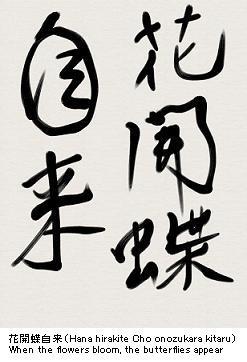Work in Japan Advice Board


- Jobs in Japan @ Daijob.com
- How Does Your Garden Grow?
Creative Career Path
How Does Your Garden Grow?2011.09.20
This Zen Proverb, probably quite ancient, is attributed in one form to Rykan Taigu (1758-1831), a Zen Monk who lived during the Edo Period. It expresses the idea that nature achieves harmony without  conscious effort.
conscious effort.
What lessons can we draw from this Zen Monk who lived 200 years ago?
The Importance of Solitude
Rykan entered a Zen Temple at an early age, and spent much of his life as a hermit or as a traveler. He is known and loved in Japan for his poetry and calligraphy, an original style characterized by bold slender strokes, and a broad sense of space. Rykan’s poetry reflects his free spirit and lack of attachments. See http://budurl.com/hl3c for English translations of Rykan’s poetry by John Stevens. His calligraphy is characterized by highly cursive and masterful strokes (http://budurl.com/hhhj). If you get an opportunity to see an exhibition of his work, the power of his spirit is palpable.
Stories of his life reveal a person who was neither bound by convention nor opposed to it. His name in characters reads 良寛大愚, meaning Good Generous Great Fool. He was known for his childlike nature and inability to harm insects. Though he lived much of his life in solitude, you sense from his writings that he was never alone. His Zen training afforded him insights and intimacy with nature that still inspire people today. Among many Japanese Zen masters of the past, he is loved for his humanity.
By comparison today we have become too busy for our own good. We do not spend enough time in solitude. Time to notice and appreciate what we have on this good earth. Spend time getting to know Rykan, and you will recover a bit of your own good, generous, great, and foolish nature. Steve Jobs said as much in his famous Commencement Address to students at Standford University in 2005, “Stay Hungry, Stay Foolish.”
Cultivate Your Garden
Looking at Japan today it seems that many of the butterflies have flown. Tourism is drastically down in the wake of the March 11 Earthquake and Tsunami. With the yen at a historical high, many Japanese companies have been forced to move even more of their production out of the country. The country can’t even keep a Prime Minister in office long enough to lead the nation. Traditional Japanese culture itself seems on the run, as modern convenience and western fashion have taken up permanent residence. It is distressing to see how few people appreciate the value of what they are losing.
The butterfly may be a symbol of ancient wisdom, of wealth, or of wonderful things that come to rest. For various and complex reasons, these butterflies seem to be vanishing from the landscape. Who cares enough to call them back? Do your part to make the world a better place.
Spend time, energy, and money on the things and people you care about. The roots of the word cultivate mean to till, to toil over, and by extension, to improve by training or education. Culture is a result of cultivation. This is why I cultivate Japanese culture.
Move Less, Attract More
Rykan’s proverb reminds us not to spend time chasing butterflies, nor to pin them up in a lifeless collection. When the flowers bloom, the butterflies appear. Whatever it is that you want in life, ultimately it is easier to attract it than to chase it down. Let it go, and it will return. Try to trap it, and it will go away. This is expressed in Japanese by the proverb tarai no mizu, water in the basin comes back to you when you push it away, and escapes you when you pull it in.
Rather than chasing after the good things in life, why not give them a reason to come to you?
William Reed WEBSITE: http://www.williamreed.jp WEB TV: http://williamreed.tv NANBA: http://www.nanbanote.com iPAD CREATORS CLUB: http://ipadcreatorsclub.com BLOG: http://www.EntrepreneursCreativeEdge.com
Article Writer
William Reed is a renowned author-speaker who coaches physical finesse and flexible focus for a creative career path. A certified Master Trainer in Guerrilla Marketing and 7th-dan in Aikido, he combines practical wisdom of East and West to help you learn personal branding at the Entrepreneurs Creative Edge.
Similar Articles
- 2015.08.04A Comparison between Western and Asian D...
- 2015.07.28Being an Effective Communicator
- 2015.07.21Making Your Presentation Interactive




